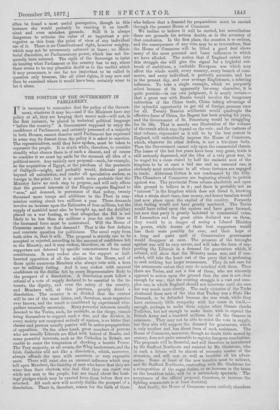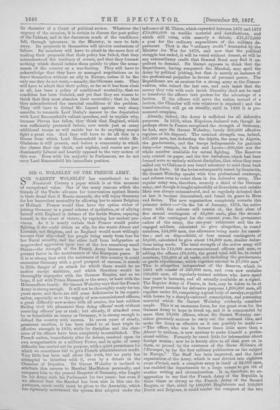THE POSITION OF THE GOVERNMENT IN PARLIAMENT.
TT is necessary to remember that the policy of the Govern- .1. ment, whatever it may be,—and if the Ministers have any policy at all, they are keeping their secret well--will not, in the first instance, be placed in technical political language "before the country." A Government supposed to enjoy the confidence of Parliament, and certainly possessed of a majority in both Houses, cannot dissolve until Parliament has expressed in some way its dissent from the policy it is asked to sanction. The representatives, until they have spoken, must be taken to represent the people. It is worth while, therefore, to consider steadily what chance there is of such a dissent, and of course to consider it we must lay aside for the moment all idea of a political secret. Any entirely new proposal—such, for example, as the acquisition of Egypt, or the purchase of the peninsula of Gallipoli—might, and probably would, dislocate parties beyond all calculation, and render all speculation useless, as foreign to the point ; but it is much more probable that the Ministry have no such step to propose, and will only affirm that the general interests of the Empire require England to " arm," and demand, in pursuance of that policy, twenty thousand more troops and additions to the Fleet in com- mission costing about two millions a year. Those demands involve an increase upon the Estimates of four millions, but the supply of matdriel must also be brought up, and the Artillery placed on a war footing, so that altogether the Bill is not likely to be less than six millions a year for such time as the increased force must be maintained. Will the House of Commons assent to that demand ? That is the first definite and concrete question for politicians. The usual reply from both sides is, that it will. The proposal is strictly one to be accepted or rejected, according to the amount of confidence felt in the Ministry, and it may reckon, therefore, on all its usual supporters not deterred by specific remonstrances from their constituents. It may reckon also on the support or half- hearted opposition of all the soldiers in the House, and of those quite numerous Members who always vote with a keen eye to military feeling. And it may reckon with unusual confidence on the dislike felt by every Representative Body to the prospect of a dissolution. A dissolution must follow a refusal of a vote of supply declared to be essential to the in- terests, the dignity, and even the safety of the country, and Members will, at this juncture, greatly dread a dissolution. The country is so divided that the contest will be one of the most bitter, and, therefore, most expensive ever known, and the result is considered by experienced wire- pullers unusually uncertain. Many powerful interests usually devoted to the Tories, such, for example, as the clergy, cannot bring themselves to support such a war, and the division in every society not composed entirely of squires, is so bitter that classes and persons usually passive will be active propagandists of opposition. On the other hand, great numbers of persons who are usually Liberals are filled with hatred of Russia, and some powerful interests, such as the Catholics in Britain, are unable to resist the temptation of checking a heretic Power. The Tory majority, at all events, the Whig landowners, and the Irish Catholics will not like a dissolution, which, moreover, always offends the men with uncertain or very expensive seats. There will exist also an unusual influence which may tell upon Members, the timidity of men who know that they are wiser than their electors, who feel that they can resist war while not sent to the people, but are timid about the hust- ings' pledges which may be exacted from them before they are returned. All such men will acutely dislike the prospect of a dissolution. There is, therefore, reason for the faith of those who believe that a demand for preparations must be carried through the present House of Commons. We incline to believe it will be carried, but nevertheless there are grounds for serious doubts as to the accuracy of that conclusion. In the first place, the occasion is so serious, and the consequences of any vote may be so tremendous, that the House of Commons will be lifted a good deal above many of the mere personal and baser influences to which we have alluded. The notion that if England enters into this struggle she will give the signal for a frightful out- break of ambitions, a veritable European war which may affect the whole world, every country, every branch of com- merce, and every individual, is perfectly accurate, and has in the present day, and over average Englishmen, a sobering influence. To take a single example, which we purposely select because of its apparently far-away character, it is quite possible—in our own judgment, it is nearly certain— that a great war with Russia would involve the temporary extinction of the China trade, China taking advantage of the splendid opportunity to get rid of foreign pressure once for all. Twenty Russian artillerists would quadruple the effective force of China, the Regent has been arming for years, and the Government of St. Petersburg would be struggling for its life. That is merely one illustration of the volume of the result which may depend on the vote ; and the vastness of that volume, expounded as it will be by the best orators in England, will undoubtedly impress the House of Commons, which, whatever its other defects, is not a frivolous body. Then the Government cannot rely upon the commercial classes. The losses of the last few years have been very great, trade is still seriously depressed, and the idea of a very great war, to be waged for a cause stated by half the eminent men of the kingdom to be at once a bad one and an unsound one, is obviously most unwelcome to all whose fortunes are engaged in trade. Alderman Cotton is not condemned by the City. The Chambers of Commerce are beginning already to protest against war. The provincial Press refuses absolutely and upon this ground to believe in it ; and there is probably not an "interest " in the kingdom which does not dread it, knowing what a strain short time, dear money, and heavy taxation would just now place upon the capital of the country. Formerly that feeling would not have greatly mattered. The Tories would have relied upon the squires and have gone forward, but now that party is greatly indebted to commercial votes. If Lancashire and the great cities declared war on them, they would be in danger of seeing a Liberal Ministry in power, while dozens of their best supporters would lose their seats possibly for ever, and their hope of a long and quiet spell of Conservative government would disappear at once. The pressure of the boroughs against war will be very severe, and will take the form of sup- porting the Liberals in a demand for guarantees which, if refused, will show that the Ministry mean war, and if con- ceded, will take the heart out of the party that is professing to seek nothing but larger armaments. They do not care for the armaments unless they may do mischief with them. Then there are Tories, and not a few of them, who are sincerely opposed to action upon the ground that the case is not clear enough for war ; that the existing struggle is a vast and com- plex one, in which England should not intervene until she sees her way much more clearly. The early victories of the Turks disabused these men of the idea that Turkey was a State like Denmark, to be defended because she was weak, while they have extremely little sympathy with her cause in i tself,— enough, perhaps, to make them rejoice when Osman checks Todleben, but not enough to make them wish to expend the British Army and a hundred millions for all the Osmans in existence. They may not be able to resist the vote in supply, but they also will support the demand for guarantees, which is only another and less direct form of such resistance. The House of Commons, moreover, though no doubt little moved by oratory, does not quite assemble to register foregone conclusions. The proposals will be financial, and will therefore be introduced by Sir Stafford Northcote and resisted by Mr. Gladstone, who in such a debate will be almost of necessity master of the situation, and will cow as well as bewilder all his adver- saries. Some at least of the new taxation must be indirect, and Sir Stafford Northcote, contending with Mr. Gladstone for a reimposition of the sugar duties, or an increase in the taxes on the breakfast-table, will be a melancholy spectacle. The acceptance of the official proposal, therefore, to increase the fighting armaments is at least doubtful. And finally, the House of Commons never entirely abandons its character of a Court of political review. Whatever the urgency of the occasion, it is certain to discuss the past policy of the Cabinet, and in the discussion much of the confidence felt, through ignorance, in the Ministry, is sure to fade away. Its proposals in themselves will involve confessions of failure. Its members will have to admit in the mere fact of making their proposals that their policy has failed, that they misunderstood the tendency of events, and that they foresaw nothing which should induce them quietly to place the arma- ments of the country on a war-footing. They will have to acknowledge that they have so managed negotiations as to leave themselves without an ally in Europe, unless it be the only one they do not want,—namely, the Ottoman caste. They will have to admit that their policy, so far as it has been clear at all, has been a policy of conditional neutrality, that no condition has been violated, and yet that they see reason to think that they must abandon their neutrality ; that is, that they misunderstood the essential conditions of the problem. They will have to defend Mr. Layard against very sharp assaults, to reconcile Lord Derby's answer to the deputation with Lord Beaconsfield's valiant speeches, and to explain why, because Plevna has fallen, they think that England, which was sufficiently protected before, now needs just as many additional troops as will enable her to do anything except fight a great war. And they will have to do all this in a House from which Lord Beaconsfield is absent while Mr. Gladstone is still present, and before a community in which the classes that can think, and explain, and reason are pre- dominantly Liberal and heartily opposed to the very notion of this war. Even with his majority in Parliament, we do not envy Lord Beaconsfield his immediate position.







































 Previous page
Previous page